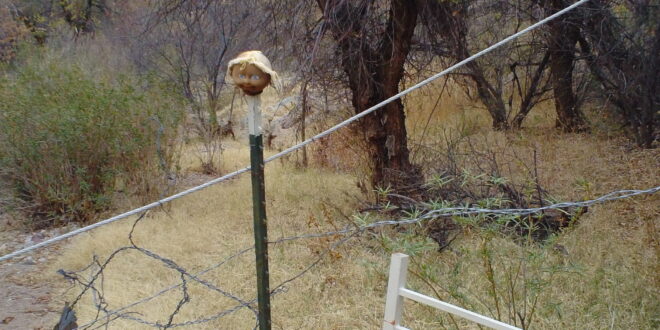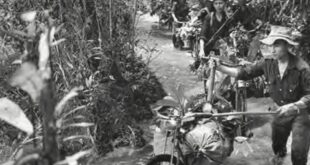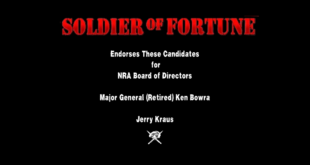by Heath Hansen
Editor’s note: In the remote no-man’s land just north of the Arizona border with Mexico, SOF correspondent Heath Hansen stationed himself at OP “Baby’s Head,” in a place where weapons, dope, and a fractured human skull have been spotted in the brush.
Here in this treacherous spot along the frontier, it is well known that the Sinaloa Cartel is in charge. Its members cross the border with impunity through the spookily named Baby’s Head Gap, aided by satellite coms in a place where cell phone reception does not exist. Heath spent several days on site, where he and his cohorts saw up close the cartels and their work. Here is Heath’s report.
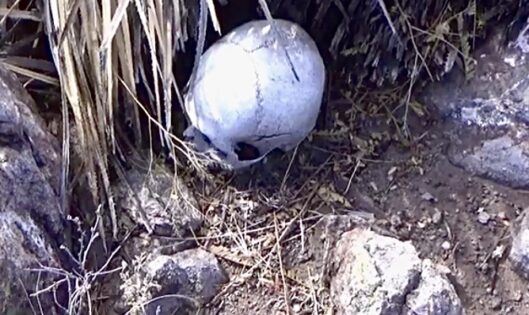
A human skull in the wilderness. Photo by Tim Foley.
ARIVACA, ARIZONA – It’s been several hours since I filled my vehicle with equipment and camping gear, and began my drive towards this tiny southwestern Arizona town. I’ll be in the field for a week, eating canned food and MRE’s, so I head to a local restaurant to get a hot meal before operations begin. As I approach the door, I notice the sign immediately next to the handle:
Unwanted – Members of any vigilante or Border militia group including, but not limited to AZ Border Recon. Do Not Enter our establishment.
I wondered if this included journalists embedded with Arizona Border Recon (AZBR) – but decided not to ask. With a long drive behind me, and a longer week ahead of me, I’m more interested in the hot meal I’ve been thinking about for a few hours, so I decide to give the place my business.
Across the street is a building dedicated to humanitarian work, helping illegal migrants continue their journey further into the US. This is Arivaca, a tiny settlement just north of Sonora, Mexico, that sits directly in the pathway of smugglers heading to Tucson – a major Sinaloa Cartel distribution hub. Tim “Nailer” Foley, the founder and leader of AZBR, is on a mission to protect his own backyard. With or without the approval of his neighbors, he provides intelligence to the US Border Patrol about smuggling activities throughout this area.
READ MORE from Heath Hansen on the border with Mexico.
I finish eating and link up with Foley, along with other members of AZBR. Like in previous operations, we start by going through the plans for the upcoming week, reviewing trail-camera footage, and loading equipment. The following morning, we head south, towards the border.
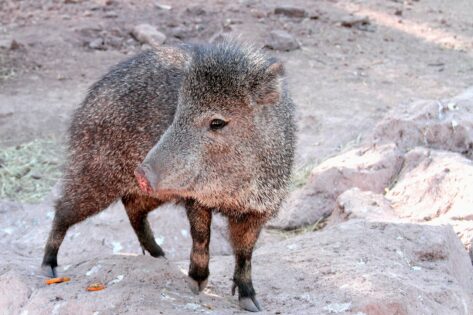
As we make our way through the parched, dusty path, I notice a female javelina dart across the road in front of me, and about four baby pig-rodents quickly following behind. They race up the small embankment, until the last one loses its footing and begins sliding down the hill. Dirt and debris fills the air around the wild animal as it frantically kicks its hooves, lets out a high pitched bark, and begins grunting, before finding traction and shooting up the hill desperately. The family of skunk-pigs reunite and disappear into the brush.
After a 45 minute drive, we arrive at the base-camp. The AZBR members set up their tents and camping gear, then don their tactical equipment. Patrols start heading out, and I get attached to a group tasked with setting up communication equipment. Other groups set up trail-cameras in different parts of the Area of Operations (AO).
My team emplaces small solar panels and a long antenna to a device that will help AZBR elements communicate with each other within the AO. We test the device and get “good copy” replies from multiple members. We then head back to camp and prepare for night ops.
I pair up with “Chili,” a surfer from Central California, who has been with AZBR nearly a decade. I gathered his nickname originated after an unfortunate episode with a “Chili and Macaroni” MRE – but didn’t ask for details. We go out with a team and set up an Observation Post (OP) about 400 meters from the “Baby’s Head” gap.
Years ago, a member of the Sinaloa Cartel stuck a Mexican doll-head to a post near the border of Mexico and the US, as a warning to anyone who may try to operate on their turf and cross the line in that area without permission. Because that was low-ground, the builders of Trump’s wall left a gap, to later construct a drainage system in that spot, but funding was cut before completion, and the gap remains. “Baby’s Head” has been a part of the AZBR vernacular ever since. We sit silently in our position late into the night, with only a bit of moonlight illuminating the trail, but do not observe any smugglers in our small sector.
Despite the cold, everyone is up by 0500 the following morning, ready to start patrols. Foley, energy drink in hand, is at the map telling the teams where to set up OP’s. I head out with two AZBR members and a journalist working on a border documentary. We tactically cross the road outside of camp and make our way up the side of a mountain.
The terrain is unforgiving; from the Cat-Claw bushes ripping into our clothing and skin, to the cactus pricking our lower legs and ankles, to the rocks ripping chunks out of our boots, this is a treacherous hike. We eventually make it to the peak and find hidden spots for observation.
“Base, Recon 5, we’re in position,” the AZBR member whispers over the radio.
The reply comes back: “Recon 5, Base, good copy. Send intel updates as you have them.”
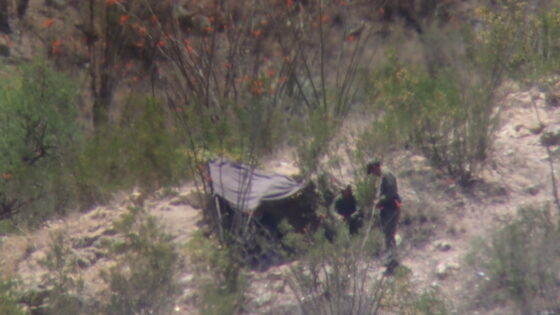
We sit, watching and waiting. Hours pass with no movement – as is the nature of reconnaissance. The sun has crested the mountain and shines down directly on us. A hawk glides over our position, patiently waiting to pounce on whatever small creature happens to catch its attention.
The air is starting to get hot, when suddenly, we spot movement on the mountain just south of the border wall. A scout is standing outside of a bunker, talking on a cell phone. There are no Mexican towns near this area, and barely a road worth mentioning. Here, in this rocky, arid expanse of land, it is well known that the Sinaloa Cartel is in charge. If you are in this spot, it’s because you’re trying to enter the United States illegally. The scout is signaling with his arm while speaking into the device. In these parts, there is no cell reception; he must have equipment that links his phone to a satellite connection – expensive service that only the cartel can afford in this area.
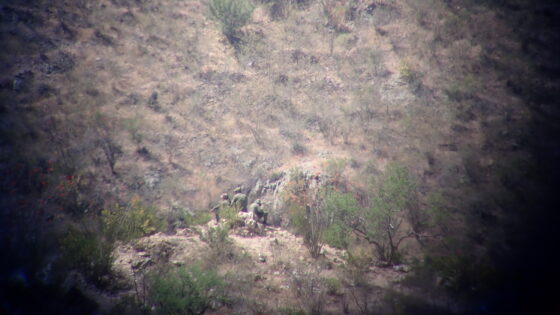
“Base, Recon 6, I have eyes on multiple pax (persons) entering at the east wall-gap. All wearing dark clothing and carrying bags,” one of the AZBR members announces over the radio.
“Recon 6, Base, what direction are they traveling,” the base RTO asks.
“Straight North,” Recon 6 replied.
“Roger, good copy. We’re activating QRF (Quick Reaction Force).”
Base sends a QRF team to track the movement of the individuals. They find sign, but the group was moving fast and the AZBR team was unable to locate them. The OP’s continued observing for the rest of the day, and spotted more scouts and cartel mules in and around the bunker, but no further movement on the north side.
The following day, the teams not involved in night ops the previous evening, headed out for patrols before the sun rose. I left with one of those teams and made my way to the top of another mountain. We got situated behind bushes, trees and cacti, and began watching.
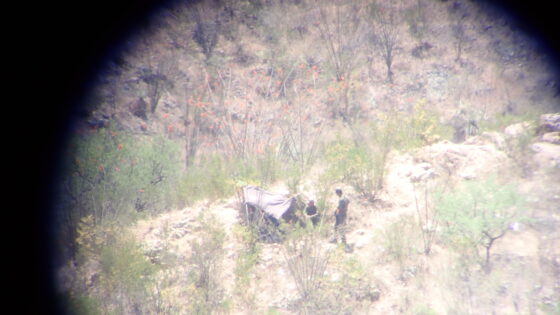
Around 1100 hours, seven Cartel mules appear from the bunker. They are all wearing dark green uniforms, and heading down the pathway towards the Baby’s Head gap. Right before crossing into the US, they stop, find shade underneath a tree, and wait.
We continue to observe – a few minutes later, another individual emerges from the bunker. Wearing blue jeans and a light green shirt, he is talking on his phone and motioning with his hands to the seven cartel mules under the tree.
Moments later. I notice a vehicle approaching the wall gap.
Recon 4, a martial-arts practitioner called “The Samurai” among AZBR members reports: “Base, Recon 4, a silver SUV just stopped directly in front of the Baby’s Head gap. Break. A blonde woman exited the car and started stacking water cases at the gap.”
“Recon 4, Base, Roger good copy, continue to observe,” is the reply.
“Base, Recon 4, she just called out to the seven individuals who came down from the bunker. Break. They walked over, grabbed the water, and are now heading back to the bunker.”
“Base, Recon 7, I have eyes on the woman. That’s [NAME REDACTED]. She works for one of the humanitarian organizations in Southern Arizona.”
Recon 7 has “volunteered” in the past for Tucson organizations that strategically stockpile water, food, and blankets on smuggling trails for migrants illegally entering the country.
Through covert techniques, Recon 7 has acquired GPS coordinates for an alarming amount of supply caches on high traffic smuggling routes. There are more than 100 stashes of this kind covering this sector south of Tucson. Each cache can supply a squad’s food and water needs for at least a day. The routes are so remote, and so out of sight, that coordinating with the cartel is the only rational way these supplies could be discovered by traffickers. He regularly shares this intel with AZBR and the US Border Patrol. I spoke with him after returning to base, and he stated he’d never seen someone delivering supplies directly to cartel members, but this was obviously coordinated because the seven individuals came down right before the SUV arrived. He personally knows the woman delivering water. In other words, “humanitarians” appear to be coordinating with the cartel.
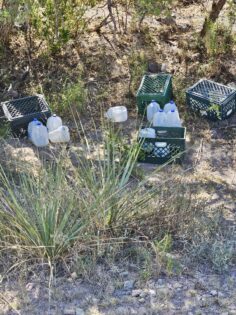
A typical water drop left by humanitarian groups
Several local humanitarian groups did not respond to questions about this from Soldier of Fortune.
The SUV continues westbound, along the border wall. We eventually lose sight of it, but continue to observe the cartel positions late into the afternoon. At one point, Recon 6 observes nearly a dozen males, wearing olive drab uniforms, on the south side of the fence.
As the sun dips below the horizon, a shot rings out – the group gathers their packs and disappears into a draw. The shot was probably an order from the scouts to start moving. We lose sight of them, but continue watching late into the evening, before heading back to the patrol base.
The following morning, Tim puts together a team to grab trail-cam videos. He grabs his second in command – the tattooed, bearded, and foul-mouthed Enzo, and has him jump into the driver seat of the Yamaha 4×4.
As Enzo starts the engine. Foley sits in the front passenger seat, takes a swig from his Red Bull, lights a cigarette, and says, “Get your asses in here unless you two want to walk.”
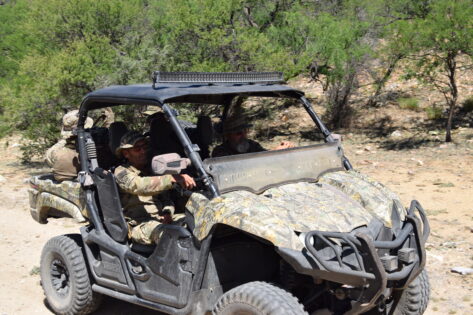
Foley and Enzo in their 4×4
The last two AZBR members hop in the bed, and Enzo slams on the gas as they head out to collect cameras near the eastern gap in the wall. A trail of dust follows quickly behind.
Months ago, Foley found a human skull near this area. The skull had a clearly visible crack on one side. He believes this person was murdered by cartel rivals and dumped in the desert. When the team returns to base, Foley begins reviewing the footage at the operations center, and members of AZBR crowd around the computer to see the contents of the SD card.
What it contains is stunning. Cartel mules made multiple passes on the trails just a few hundred meters from our base-camp. AZBR teams were positioned in other OP’s and didn’t have the manpower to effectively monitor all the trails. The five individuals observed crossing into the US at the eastern gap in the wall 24 hours earlier, are seen heading South, back to Mexico, without their packs, towards the Baby’s Head gap. Tim believes they had successfully handed off the dope they were carrying to a waiting vehicle, and made the trek South less than a day later.
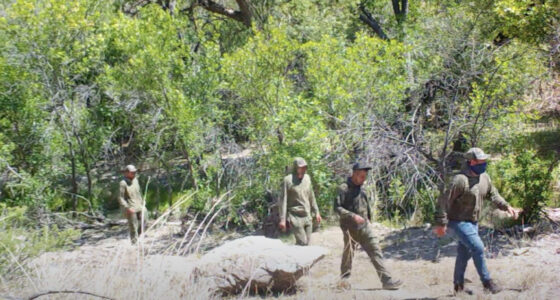
Video clip of men walking through Sinaloa turf inside Arizona
We view more videos and see more activity, including the cartel member we had observed the day before, wearing blue jeans and a light green t-shirt – on the American side of the border this time. One thing no one saw was “men, women, and children, looking for a better life.” These were all military aged males, entering and exiting a sovereign country unhindered. No customs agents checking their passports; no Border Patrol agents stopping them from entering. It’s wide open.
Later that afternoon, AZBR sends out more patrols. They know they are out-manned. They know the federal government is understaffed and therefore unable to handle this amount of activity. The AZBR will continue to occupy the OP’s until the end of the operation.
 Soldier of Fortune Magazine The Journal of Professional Adventurers
Soldier of Fortune Magazine The Journal of Professional Adventurers


